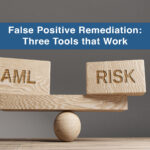If you work in AML Compliance, the “Yates Memo” is likely on your mind. After years of the U.S. Treasury and Justice Departments settling cases of corporate misdeeds via large fines and deferred prosecution agreements (DPAs), pressure is building in the U.S. to pursue criminal prosecutions against individuals who engineer corporate law-breaking. And the new Volkswagen scandal may be the ultimate litmus test–and worth following by AML Compliance professionals.
Sally Yates, author of the “Yates Memo” as the U.S. Deputy Attorney General, burst onto the business-news scene recently when she announced that the Justice Department intended to throw its weight behind a new approach to white-collar corporate crime. No longer will the Justice Department settle for admissions of corporate culpability and resulting fines and DPAs, but instead it will also pursue charges against individuals responsible for corporate decision-making. And perhaps more importantly, Yates asserted that corporations will only qualify for credit for cooperation if they fully cooperate in disclosing the behaviors and culpability of named individuals within the corporation.
To read details about the Yates Memo and its potential impact on businesses, read Jeff Tsai’s blog at law.com or this New York Times story about why cases such as those from Wall Street’s recent past will remain tough to prosecute.
The stunning revelations this week from Volkswagen about its longstanding, high-tech, and deeply institutionalized engineering efforts to deceive emissions-standards testing may test the Justice Department’s resolve in this new approach. Professor Mark Kleiman from the UCLA School of Public Policy describes the policy angles of Volkswagen’s dark decisions regarding emissions standards, and the U.S. Justice Department has announced it will conduct a criminal probe of the company. What remains to be seen is whether the Justice Department also pursues charges against individuals, some of whom have already admitted their role in decision-making relative to the emissions engineering.
For AML Compliance professionals in financial institutions, these new rumblings about prosecuting individuals must feel a bit scary, especially if they are working in environments where the tone from the top allows colleagues across the institution to claim wiggle room regarding BSA/AML regulations and the like. But they might also provide opportunity for more and better best practices. That is why AML Partners includes documented shared accountability into its AML software solutions.
“We help customers embrace the four-eyes principle and shared accountability,” said CEO Frank Cummings. “We know that the vast majority of people want to do the right thing, and we build that into our software.”
He gives the example of SURETY-CDD for on-boarding. Cummings said the workflow requires review and acceptance by multiple users, and the system logs every change made by each individual user. Users can also leave notes that become a permanent part of the client record.
“All of these features help create a permanent and deeply detailed digital history of customer due diligence, which protects not only the institution but also individuals within the institution. It’s a win-win for everyone striving to achieve effective and efficient compliance.”

